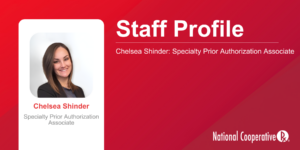With the opioid epidemic receiving national attention in recent years, members of National CooperativeRx are asking what is being done to combat the issue. One of our in-house pharmacists, Jocelyn Kerl, takes a closer look.
Nationally
Legislation has influenced the expansion of prescription drug monitoring programs (PDMPs) nationwide. PDMPs help support access to controlled substances for legitimate medical use, identify and prevent prescription drug abuse and diversion, facilitate the identification and treatment of people addicted to prescription drugs, and inform public health initiatives by examining controlled substance use and abuse trends.
Forty-nine states in the US support PDMPs. PDMPs are statewide databases that contain information about federally controlled prescription drugs. The database may also contain prescription information for other substances deemed addictive or abusable by the state in which the database is run.
Wisconsin
Wisconsin’s PDMP is housed online. The Controlled Substances Board has oversight of the program and receives input from additional health care professions, including dentistry and veterinary medicine. The premise of the PDMP is that pharmacies and other dispensers of controlled substances must collect and submit data to the database. This data is then shared between dispensers and authorized users to provide complete information. Each prescription record in the PDMP will display the following information:
- Prescriber name and Drug Enforcement Administration (DEA) number
- Dispenser name and DEA number
- The drug’s National Drug Code, quantity dispensed, estimated days supply, prescription number, refills authorized, date prescribed and date dispensed
- Patient first and last name, address, date or birth, gender, and payment method
- The name of the person picking up the prescription
Authorized users of the database (government workers, health care professionals, law enforcement personnel and medical examiners) may obtain information from the PDMP. Wisconsin also shares prescription information with 14 other states.
Recent Updates to the Wisconsin PDMP
In January 2017, the Wisconsin PDMP was transferred to a new platform, considered the enhanced PDMP (ePDMP). As of April 2017, dispensers and authorized users are experiencing stricter reporting requirements and additional functionality. Dispensers now have only one business day to submit records to the PDMP, whereas previously they had seven. Prescribers must now review the PDMP prior to writing a prescription for a controlled substance — unless the patient is enrolled in hospice care, the prescription is intended for less than or equal to a 3-day supply and is not subject to refill, the drug is lawfully administered to the patient, it is an emergency, or the PDMP system is down. Prescribers will see flags if their patients are prescribed concomitant opioids and benzodiazepines or if the Morphine Milligram Equivalent (MME) dose exceeds a certain threshold. These alerts are in line with recommendations from the Center for Disease Control.
PDMP Expansion
Along with the stricter requirements and enhanced features, the PDMP is expanding its reach. Law enforcement agencies and prosecutorial units can request PDMP data without court orders if they are engaged in an active and specific investigation or prosecution or monitoring a patient as part of a drug court and the data sought is reasonably related. Non-prescriber health care professionals (e.g. RNs, medical directors) and substance abuse professionals are also now authorized users and can create PDMP accounts. Law enforcement officials are required to report certain events to the PDMP including suspected violations of the Controlled Substances Act involving prescription drugs, opioid overdose events, and stolen controlled substance prescriptions.
The US has made great strides in the oversight of controlled substances in recent years through the expansion of the PDMP and the rescheduling of medications. It is exciting to see policy change in action impacting how health care is provided across the nation. The PDMP is a tool that will continue to evolve and enhance health care providers and payors with the ability to minimize fraud, waste, and abuse — all while keeping health care centered on the patient.




